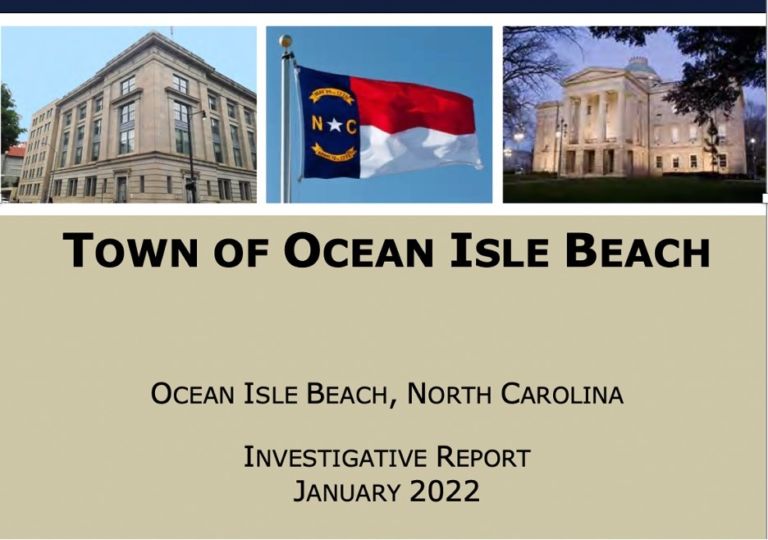- Long-term incompetence in the Elizabeth City Finance Department has led to financial woes for the city
- The North Carolina Local Government Commission has the legal authority to take over local government finances
- A state takeover could help Elizabeth City get its financial house in order
North Carolina Treasurer Dale Folwell has asked the members of the Elizabeth City Council to voluntarily submit to the state’s Local Government Commission taking over their finances. They have so far refused, but that may only result in an involuntary takeover within the year.
Elizabeth City’s Fiscal Mismanagement Lands It on the State’s Financial Naughty List
So, how did Elizabeth City get to the point where it may lose control of its finances?
The fundamental problem appears to lie with incompetence in the city’s finance department.
The city fired its finance director in 2017 over problems with the utility payment system, but the leadership in its finance department does not appear to have improved since then. Their problems caused the North Carolina Local Government Commission (LGC) to put the city in the “high risk” category for internal fiscal controls and financial issues with its general fund after its fiscal year 2019-2020 annual audit. It placed Elizabeth City on the Unit Assistance List (UAL). Governments on the UAL must get LGC approval for some capital expenditures, and their managers must take remedial fiscal management classes.
Elizabeth City citizens have also started to notice the city’s financial woes. Twenty-three people wrote to the LGC between Dec. 11, 2022, and June 4, asking them to deal with the city’s financial woes. A common refrain of those letters is that the “inexperienced city finance staff” cannot manage its funds and that the town is not able to properly maintain public services and infrastructure. One letter-writer noted what he saw as a disconnect between the city’s economic vibrancy and its government’s malaise: “Our downtown is booming, our population is growing, and our finances are in a mess.” Elizabeth City’s financial wounds are self-inflicted.
The city had to bring in an independent advisor to complete the overdue 2020-2021 fiscal year audit. A resulting audit found 13 “deficiencies in financial oversight” that contributed to the city spending almost $1.5 million more than planned for in its budget.
State Law Allows for an LGC Takeover of City Finances
Elizabeth City’s continued failure to get its financial house in order prompted North Carolina Treasurer Dale Folwell to send a letter to city leaders on March 14 asking them to let the LGC take over their finances voluntarily. But the letter also serves as a warning that an involuntary takeover is imminent.
Does the LGC have the authority to take over Elizabeth City’s finances involuntarily?
Yes, it does.
State law authorizes the LGC to take over any local government’s finances if commissioners believe it is heading towards a fiscal cliff or if the local government refuses to heed the LGC’s warnings about not complying with state law (G.S. § 159-181(c)):
The Local Government Commission shall have authority to impound the books and records of any unit of local government or public authority and assume full control of all its financial affairs (i) when the unit or authority defaults on any debt service payment or, in the opinion of the Commission, will default on a future debt service payment if the financial policies and practices of the unit or authority are not improved, (ii) when the unit or authority persists, after notice and warning from the Commission, in willfully or negligently failing or refusing to comply with the provisions of this Chapter, or (iii) when the General Assembly suspends the charter of a municipality.
Elizabeth City is hardly alone in having financial troubles. There are 138 municipalities and 12 counties on the Unit Assistance List. However, most of those governments will eventually get their finances in order and avoid being taken over by the state. Only four municipalities and a sanitation district are currently under LGC control.
A State Takeover May Be the Start of Elizabeth City’s Comeback
Elizabeth City Mayor Kirk Rivers has been defiant in the face of his city’s financial problems, telling a reporter, “By no means would I ask the state treasurer to take over the city of Elizabeth City.”
That question may soon be out of his hands. The LGC could vote to involuntarily take over the city’s finances as soon as its Aug. 1 meeting.
State Auditor Beth Wood, a member of the LGC, said that the city is “already severely non-compliant” with G.S. § 159. Wood, like others, lays the blame on the city’s finance department:
People that have been there said they don’t have a finance officer that can do their job. They have had people come in and try and help. And coach, but (they) just can’t do it… It can’t be cleaned up until the leadership changes is my point.
Even Deputy State Treasurer Sharon Edmundson, who has resisted calls for the LGC to take over Elizabeth City finances, acknowledged that city leaders “still don’t know what their current financial condition is.”
While temporarily losing control of their finances could be a blow to city leaders’ pride, it would likely be to Elizabeth City’s long-term benefit. Folwell noted in his March 14 letter that an LGC takeover would help the city with bookkeeping, put “the right people in the right positions” in the finance department, and “make the necessary but hard decisions” about taxes, utility rates, and spending to get the city back on sound financial footing.
When the LGC took over the finances of Kingstown (in Cleveland County) in 2020, their mayor pro tem welcomed it as a “chance to reset” the town’s finances. The LGC also helped the city secure a $250,000 grant to fix ongoing problems with its sewer system.
The state should avoid taking over local finances whenever possible since it removes democratic accountability from funding decisions, but Elizabeth City’s failure to get its finances in order may leave the Local Government Commission with no choice.


